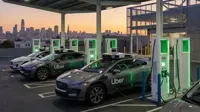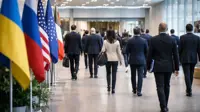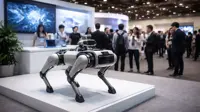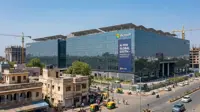Tax reform, staff crunch top India Inc wishlist
15 Jan 2007
So what is it that''s top of the mind of India Inc before Budget 2007 is unveiled?
Adi Godrej, managing director, Godrej Industries, is a bit concerned on reforms in the indirect tax system, while lack of human capital is bothering Nandan Nilekani, MD and CEO, Infosys. And who better to resolve their worries than the finance minister himself.
So these industry giants put forth their queries to the FM on the occasion of the inaugural of the TV-18 media centre at the National Stocks Exchange in Mumbai.
Nilekani said that the lack of human capital in the times ahead remains a huge concern. "It will be human capital infrastructure which will actually be the bottleneck as we run into shortages in all industries. National Knowledge Commission, of which I am a part, has submitted its higher education reforms last week to the prime minister. So I was wondering what would be the focus on increasing the allocation for higher education and creating the environment where more Indians can get education to get the job there are going to be there?"
The FM responded that for the time being it is difficult to spell out any numbers, and a huge amount of funds will have to be raised for this particular issue.
"Increasing allocation is one thing, but the capacity to use those funds and expand rapidly is yet another challenge. I think the Moily Committee report and the expansion of opportunities in situations of higher learning to accommodate the backward classes, schedule caste and schedule tribes. There is also the Knowledge Commission Report with its proposal to allow many more universities in the country. All this, of course, will require large amount of funds. Once the funds are provided, we must have the capacity to roll out the expansion in as short a timeframe as possible; I think there are twin challenges," he explained.
Godrej on the other hand voiced his concern on whether there is further opportunity for accelerating the growth rate to an early reform of the indirect tax system. He questioned whether there would be a one goods and services tax estimate in early date, so that a win-win situation is created - a virtuous cycle of lower prices, higher consumption and higher revenues?
The FM stated that this was a ''three-stage process''. "The first was VAT. We have successfully rolled out VAT throughout the country except in one recalcitrant state. The second step is to phase out CST. On that we have a consensus, but the details have to be worked out. The third step is GST, and for that the date is 1 April, 2010," he clarified.
Nilekani also stressed on the need to increase the pace of judicial reform and the speed at which judicial decisions are taken, he said that India only has about 13 judges per million. "So how would the government look into increasing allocations to strengthen the judiciary?" he questioned.
"At
today''s compensation levels, not many top-notch lawyers
would like to become judges. I think there is a constraint
in the supply
side also. We need to look at compensation packages
for judges at all levels and attract the best talent,
otherwise we would have first-rate lawyers but not first-rate
judges," said Chidambram.
Latest articles
Featured articles

The $250 billion pivot: how 2026 became the year AI paid the rent
By Cygnus | 18 Feb 2026
2026 marks the shift from AI “promise” to “profitability.” Explore how India’s sovereign compute and Infosys’s revenue metrics are defining a $250B market pivot.

The analog antidote: perception, reality, and the "Windows crisis" narrative
By Cygnus | 17 Feb 2026
Viral claims of a Windows collapse contrast with market data showing a slower shift as enterprises weigh AI, hardware costs, and legacy systems.

The analog antidote: why Americans are trading algorithms for physical media
By Cygnus | 16 Feb 2026
Vinyl, books, and DVDs are seeing renewed interest as Americans seek ownership, focus, and a break from screen fatigue in an increasingly digital world.

China opens market to 53 African nations in zero-tariff pivot
By Cygnus | 16 Feb 2026
China will grant zero-tariff access to 53 African nations from May 2026, reshaping global trade ties and deepening economic links across the Global South.

The deregulation “holy grail”: Trump EPA dismantles the legal bedrock of climate policy
By Cygnus | 13 Feb 2026
The Trump EPA moves to rescind the 2009 Endangerment Finding, reshaping federal climate authority and business risk.

Tokenising the gilt: what the UK’s digital bond pilot could mean for sovereign debt
By Cygnus | 12 Feb 2026
HM Treasury selects HSBC Orion and Ashurst LLP for its Digital Gilt Instrument (DIGIT) pilot. A deep dive into the architecture, legal framework, and the shift toward near real-time settlement.

The silicon-rich AI race: how Cisco’s G300 puts networking at the center of compute
By Cygnus | 11 Feb 2026
Cisco's new Silicon One G300 targets AI data center bottlenecks as networking becomes central to compute performance.

Server CPU Shortages Grip China as AI Boom Strains Intel and AMD Supply Chains
By Cygnus | 06 Feb 2026
Intel and AMD server CPU shortages are hitting China as AI data center demand surges, pushing lead times to six months and driving prices higher.

Budget 2026-27 Seeks Fiscal Balance Amid Rupee Volatility and Industrial Stagnation
By Cygnus | 02 Feb 2026
India's Budget 2026-27 targets fiscal discipline with record capex as markets tumble, the rupee weakens and manufacturing struggles to regain momentum.










